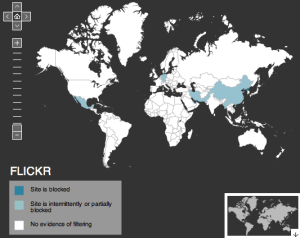I’m spending this weekend at the Al Jazeera Forum in Doha, where I was asked to participate in a seminar on the role of the blogosphere in bringing social and political change. The question posed to us — Hisham Almiraat, Mohamed Najem, Georgia Popplewell, Ramsey Tesdell, Nasser Weddady, and myself — revolved around the article Malcom Gladwell published in the New Yorker last month claiming that online connections are purely weak ties and that social media are therefore incapable of creating or sustaining a social movement.
I side with those — David Weinberger, Zeynep Tunecki, and others — who have responded to Gladwell by saying that attempting to cleanly separate online and offline media (or connections, or actions) is a futile pursuit. Social media are an integral part of a new media ecosystem, one in which bloggers are amplified and inspired by more traditional forms of media and in which mainstream media outlets increasingly partner with citizen journalists to provide the most complete coverage they can.
Throughout the forum, panelists have repeatedly raised this theme, arguing that framing media as old versus new or mainstream versus citizen is not a productive approach to understanding the impact of online networks. Speakers who work with major news outlets have thanked bloggers for sharing their first-hand accounts of what’s happening on the ground, while bloggers have thanked major news outlets for broadcasting their reports. In a break-out discussion on Saturday, citizen journalists from Tunisia and Egypt said that Al Jazeera’s amplification of their voices helped bring the situations in these countries to a tipping point.
This idea of a media ecology is one I’ve been mulling over as I’ve been working with the Technology for Transparency Network over the past year. We’ve interviewed more than 60 organizations who use digital tools to promote transparency and accountability in their governments, and one of our key conclusions has been that organizations who build partnerships with traditional media organizations — whether these are local radio stations or major national newspapers — tend to have more success than organizations that rely solely on the Internet to get their message across. For me, it’s been interesting to hear that this is the case not only when talking about city budget transparency, but also when talking about revolutions.
I don’t think this in any way diminishes the importance of social media in the movement for government accountability. In many cases, both local radio stations and national papers (and, as I’ve heard this weekend, Al Jazeera) would be unable to report on the stories they cover without the help of bloggers and tweeters. I’m glad to see that those who are here at the forum — both traditional and citizen journalists — are willing to exlore these partnerships and acknowledge their importance.
